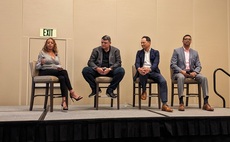Either the COO has to have IT skills or the CIO needs to be closer to customers and the value chain, says Met Office CIO Charles Ewen
The chief information officer (CIO) and chief operating officer (COO) roles are merging, according to many technology leaders. A CIO in financial services (speaking at a recent Computing event u...
To continue reading this article...
Join Computing
- Unlimited access to real-time news, analysis and opinion from the technology industry
- Receive important and breaking news in our daily newsletter
- Be the first to hear about our events and awards programmes
- Join live member only interviews with IT leaders at the ‘IT Lounge’; your chance to ask your burning tech questions and have them answered
- Access to the Computing Delta hub providing market intelligence and research
- Receive our members-only newsletter with exclusive opinion pieces from senior IT Leaders






















